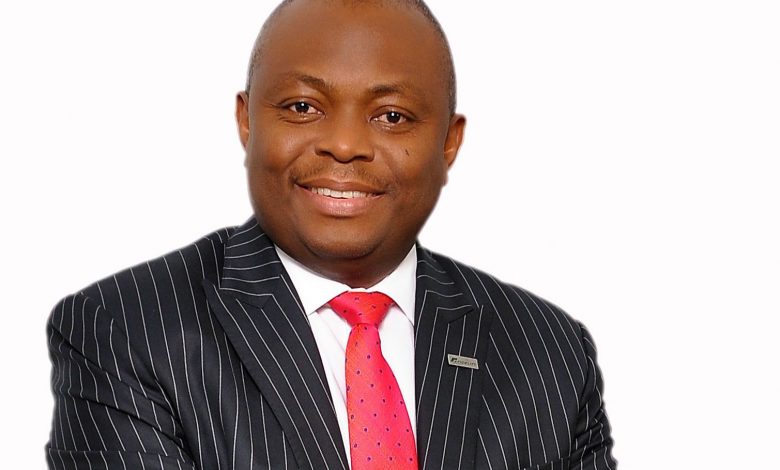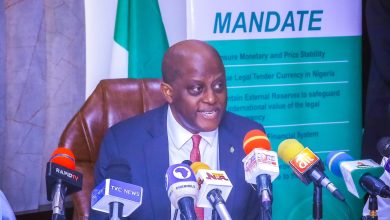OKONKWO: ENDING ON A GOOD NOTE

Throughout the tenure of NnamdiOkonkwo, the outgoing Chief Executive Officer, CEO, of Fidelity Bank Plc ,the economy was in a bad shape . In 2015 ,the crude oil price crashed to rock bottom ;in 2016 ,a deep recession put economic agents in disarray ; between 2017 and 2019 till the first half of 2020 ,no respite yet .Consequently, declining margins, stagnant growth and falling market shares put some banks’ chiefs on their toes . But in spite of inclement environment during his tenure , Okonkwo grew the bank to a double digit profit level during and at the end of each of those financial years .
Okonkwo is surely ending on a good note .He has proved, once again beyond any doubt ,he had the stamina to withstand the challenges .Despite the corona virus induced economic headwinds, the bank grew its profit before tax exponentially by 22 percent trudging up to N12.0 billions in the first half of 2020 from N9.8 billions in the corresponding period of June 2019;within the same period net income skipped up by 33 percent to N11.3 billions compared to N8.5 billions in June,2019.Not only that .The balance sheet metrics were equally impressive .During the period, its total Assets rose by 13.7% from N2.1trillion in 2019 to N2.4trillion this year whilst Total Deposits rose by 14.8% from N1.2trillion to N1.4trillion during the same period. Moreover the regulatory ratios remained above the required thresholds with Capital Adequacy Ratio increasing to 18.8% from 18.3% due to the capitalization of H1 2020 Audited Profits while Liquidity Ratio stood at 32.1%. .Even the bank’s assets quality at 4.8 percent was within the minimum regulatory requirements and one of the industry best .
.The bank’s marketing machine proved highly efficient with its deposits base hauled up strongly. A first proof of the management proficiency and the bank’s strong brand equity was obvious in customers’ preference for the bank as safely net during the pandemic. Despite the slowdown in economic activities in H1 2020 (especially in Q2), Fidelity Bank recorded an increase in deposits from customers. Deposits from customers rose to +28.16% in H1 2020. Its deposits from customers increased from N1.097trn in H1 2019 to N1,405.95bn. Fidelity Bank is taking advantage of digital technologies to evolve into an inclusive lender and a dominant player offering innovative solutions well beyond mundane banking services. As a reputable lender that places customers’ needs at the heart of its business, the Bank has continued to expand its service channels through the provision of best-in-class electronic banking offerings.
According to sources within the bank, these solutions are tailored specifically to meet and exceed the aspirations of the Bank’s customers .
With its new responsive design and rich capabilities, customers can conveniently carry out transaction on computers and mobile device without a token
By the half year 2020 results of Fidelity Bank Plc, Okonkwo had proved that it is not only what you make that matters but what you make out of it .While bottom line displayed impressive performance, however, the top line waslethargic. The gross earnings jumped 2 percent to N105 billions in June,2020. .Moreover , a breakdown of bank’s sources of the gross revenue indicates the earnings assets contributed the lion share with a 2.1 % growth as interest and similar income that delivered N87.6bn; interest income accounted for 82.9% of the total earnings. However, the non interest income with 17.8 % growth contributed N18.3 billions to the gross earnings.
But the bottom line that matters was among the industry best . Analysts attributed this development to the management ability to strategize its operations and adopt a fit for purpose business continuity plan. For the Bank CEO, Nnamdi Okonkwo .”The performance for the period, reflects the resilience of the bank’s business model. “Due to the global and domestic headwinds witnessed in H1 2020, we proactively increased our cost of risk as the impact of the pandemic slowed down economic activities whilst adapting our business model to the new risks and opportunities of the new normal” he stated .
The feat achieved, however, was not on a platter of gold . A detailed analysis of the bank’s book further shed light on the challenges of the global and domestic economic headwinds induced by low yields and Corona virus pandemic on the core banking income area of its operationsalmost put the income from the earnings assets on line The real hard nut every bank strives to break is the risk of mismatches between the borrowing and lending rates and between assets and liabilities
For the above, the management was quite undaunted as it increased the amount of its loan portfolio. .The bank supported business growth as its loan to customers rose in H1 2020 by 29.99 percent Y-o-Y, its loan to customers rose from N999.32bn in H1 2019 to N1,209.1bn in H1 2020.Also its net loan book bumped by 7 percent YTD to N1,209.1bn from N1,127.0bn in 2019FY. However , Fidelity Bank noted that actual growth in loans was 4 percent while the impact of naira devaluation resulted in 2.8 percent growth
In spite of the above hike in its loan book and the prevailing pandemic that slowed economic activities down ,Okonkwo proved himself to be an astute banker lending safely and profitably. The bank’s NPL ratio dropped slightly in H1 2020. Its NPL ratio declined from 5.4% in H1 2019 to 4.8% in H1 2020. Analysts attributed its relatively high NPLs to the early identification of sectors likely to be adversely affected by the corona virus pandemic and economic lockdowns. Foreign currency NPL accounted for 11.5% of total the bank’s total NPLs which was largely in the downstream oil & gas and transport sectors .
In reflection of the bank’s early conservative assessment of the sectors that were affected by the COVID-19 pandemic, the bank’s Non-Performing Loans (NPL) ratio increased to 4.8% from 3.3% in 2019FY
During the first half of the year , low yields prevailed but Fidelity Bank Plc through a daft application of experience achieved a positive outlook in translating its earnings assets to profit albeit marginally. Interest income jumped by 2.1 percent from N85.830 billions in the first half of 2019 to N87.622 billions in June 2020 .The management moved further to cut deeply the wings of the interest expense by 20 percent as the expenses on earnings assets came down to N39,302 billions from N48,931 billions in June ,2019 .The positive impact of this was reflected in its whopping amount cornered as its net interest income which rose 31 percent to N48,320 billions from N36,899 billions in 2019 .
However, at this point impairment loss skyrocketed to N7,841 billion in the first half of 2020 from a huge loan loss reversal of N5,326 billions in 2019. This positioned itself a big potential spoiler to the core banking or business of maturity transformation during the period under review. This had a damaging effect on Net interest income after impairment as it came down by 4 percent from N42,225 billions in 2019 to N40,479 billions in the first half of 2020 .The bank recorded a significant rise in its impairment losses as a result of business disruptions and revenue losses that came about as a result of the coronavirus pandemic in Q1 and Q2 2020. A plausible reason for the rise in impairment costs could be the increase in provisions by the bank to mitigate future losses that may arise as a result of an inability to recover some loans due to business disruptions caused by the coronavirus .
However , the bank’s total operating income which inched forward by 27.1 % to N66.6bn compared to the total operating expenses equally rose by 8
3 percent to N46.8bn largely due to increased regulatory costs mitigated the impact of the impairments . Moreover, it could be observed that the bank’s growth in operating expenses was below the growth in the economy’s headline inflation rate of 12.82 % in July 2020.The Lilliputian rise in the total operating income as against leviathan rise in the total operating expenses mitigated the impacts of the whooping impairment . This equally led to a mild decline in its cost-to-income ratio. Its CIR for H1 2020 saw an improvement to 70.3% from 72.8% in H1 2019 but the CIR remained one of the highest for the banking sector in the first two quarters of the year
Consequently, the bank’s profit before tax (PBT) climbed a few notches by 21.92 % in H1 2020.The bank would have registered better results at the bottom line but due to certain accounting compliance carried out .
.According to the CEO , Fidelity Bank, re-stated its H1 2019 figures from N15.1bn to N9.8bn to reflect the impact of IFRIC 21- Levies, which was adopted for the first time on the H1 2020 financials. “The key impact of IFRIC 21 was that our 2020FY AMCON Cost was recognized 100% in our H1 2020 Accounts rather than been amortized over 12 months as was done previously on our financials” said the Fidelity CEO”. He further revealed that, without implementing IFRIC 21, profit for the period would have been N17.9bn compared to the N15.1bn reported in H1 2019. In spite of this the bank recorded a surge in Profit Before Tax of N12.0bn from N9.8bn in 2019, which translated to a 22% growth. Net profits for Fidelity Bank grew by 33% from N8.5bn to N11.3bn in the reporting period. The superlative rise in the operating income compared to the operating expenses impacted positively on the margins. The bank’s pre tax margin climbed 11.3% in June, 2020 against 9.5 % in June 2019 ;net income followed the same direction as it rose to 10.7 percent from 8.2 percent during the same period.
The bank also provedits capabilities to convert assets and equity to profit albeit marginally. It Return on Assets, ROA, improved from 0.40 percent to 0.47 percent while Returns on Equity, ROE ,increased from 3.6 percent to 4.5 percent.
Buoyed by the H1 performance, the bank is optimistic about the remaining part of the year. “We believe the new phase of normalcy will unveil some growth opportunities. We will continue to monitor and pro-actively manage any evolving risks as the Nigerian economy gradually reopens and economic activities pick-up in key sectors” Okonkwo stated




